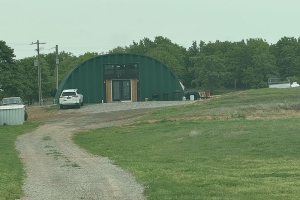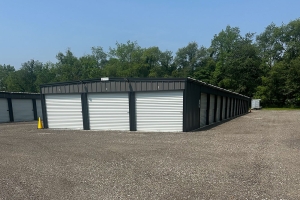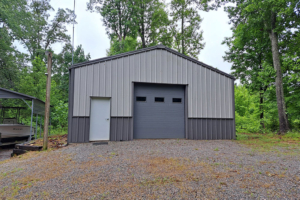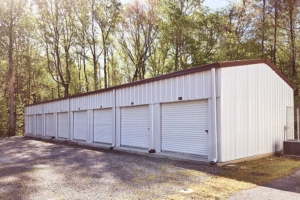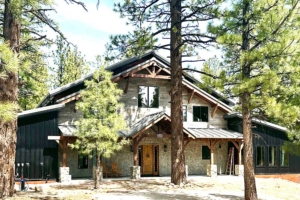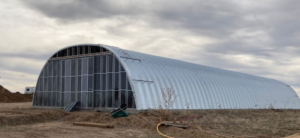Sustainable Data Centers: Efficient And Eco-Friendly Buildings
April 14, 2025 | Data Centers
As the world becomes more digital, the demand for data storage and processing continues to grow rapidly. Data centers are essential for this digital infrastructure, but they can also have serious environmental impacts. To meet the growing need while minimizing these impacts, many are turning to sustainable, energy-efficient solutions like steel buildings.
Steel offers numerous advantages for creating eco-friendly, durable, and energy-efficient data centers. These structures not only withstand the test of time but also support a more sustainable future. By choosing steel, you can ensure you are building data centers that are effective as well as environmentally responsible.
The Growing Demand For Sustainable Data Centers
The demand for data storage and processing is growing at an unprecedented rate. As more businesses and individuals rely on digital technologies, the need for data centers has skyrocketed. From cloud computing and e-commerce to the Internet of Things (IoT) and artificial intelligence (AI), data centers are the digital economy’s backbone.
This rapid expansion has led to increased energy consumption and environmental concerns. Traditional data centers often rely on energy-intensive cooling systems, contributing to significant carbon emissions. As a result, the pressure is mounting for data centers to function more sustainably while meeting the ever-growing demand for data.
Why Sustainability Matters In Data Center Construction
Data centers contribute to global energy consumption, accounting for about 1% of the world’s electricity use. Constant server operations and cooling requirements drive their high energy needs. This results in substantial carbon emissions, particularly when relying on non-renewable energy sources.
Sustainability in data center construction is crucial to reduce environmental impact. These buildings can reduce their energy use and carbon footprint by using energy-efficient designs and eco-friendly materials. Sustainable practices help ensure the long-term efficiency of data centers while supporting the fight against climate change.
Challenges Of Traditional Construction In Data Centers
Traditional construction materials like wood and concrete have notable environmental drawbacks. Concrete production generates significant carbon emissions, contributing to global climate change. Additionally, concrete is heavy and resource-intensive, increasing transportation emissions.
Wood, while renewable, can lead to deforestation and degrade over time, impacting building stability. Moreover, traditional materials often create excessive waste during construction, extending timelines. These challenges make it clear that sustainable alternatives, like steel, offer a more eco-friendly and efficient solution.
What Makes A Data Center Sustainable?
Sustainability in the context of data center buildings refers to minimizing environmental impact while maintaining operational efficiency. Sustainable data centers use strategies that reduce energy consumption, conserve resources, and lower emissions. These strategies focus on the following:
Energy Efficiency
Energy efficiency is a critical component of sustainable data centers. Data centers can significantly reduce their electricity consumption by utilizing energy-saving technologies, such as efficient cooling systems, advanced insulation, and renewable energy sources. These measures lower operational costs and decrease the facility’s carbon footprint.
Water Conservation
Water conservation is vital for sustainable data centers, as cooling systems can consume large amounts of water. Data centers can minimize water usage and reduce strain on local water supplies by implementing water-efficient systems, such as closed-loop cooling and rainwater harvesting. This helps to ensure that resources are used responsibly.
Carbon Reduction
Reducing carbon emissions is a primary goal for sustainable data centers. This can be achieved by powering the facility with renewable energy sources like wind or solar power. Additionally, designing energy-efficient buildings and optimizing energy use help lower the carbon footprint of data center operations, contributing to global efforts to fight climate change.
Waste Management And Recycling
Waste management and recycling are essential to sustainability. Data centers generate electronic waste, packaging, and other materials. By implementing effective recycling programs and reducing waste through mindful design, data centers can reduce their environmental impact. Reusing materials and recycling components ensures less waste.
Design
Sustainable design involves building data centers that are energy-efficient, resource-conserving, and environmentally friendly. Incorporating natural lighting, efficient airflow, and space optimization can reduce the need for artificial lighting and cooling. A well-designed data center can operate more efficiently, reducing energy consumption and operating costs.
Material Selection
The materials used in data center construction play a significant role in sustainability. Choosing environmentally friendly materials, such as sustainable insulation and recycled steel, can reduce the building’s carbon footprint. Steel, in particular, is durable, recyclable, and energy-efficient, making it an ideal choice for constructing eco-friendly data centers.
Why Material Selection Matters In Building Data Centers
The materials used in building data centers play a critical role in achieving long-term sustainability. The choice of construction materials impacts energy efficiency, carbon emissions, and resource conservation. Sustainable materials can help reduce the environmental footprint of a data center while enhancing its durability and performance.
Here’s a look at how different materials contribute to sustainability goals:
- Concrete: Concrete is durable but carbon-intensive, contributing to significant emissions during production. It can be made more sustainable with low-carbon alternatives or recycled materials.
- Wood: Wood is renewable and absorbs carbon dioxide, reducing emissions. Sourcing must be sustainable to avoid deforestation and environmental damage.
- Steel: Steel is strong, durable, and 100% recyclable, supporting long-term sustainability. Steel buildings are energy-efficient and require minimal maintenance, reducing overall environmental impact.
Why Steel Is An Ideal Choice For Sustainable Data Centers
Steel is ideal for constructing sustainable data centers due to its durability, energy efficiency, recyclability, and modular design. It plays a crucial role in lowering operational costs and the environmental impact of data centers. Here’s how steel contributes to data center efficiency and sustainability:
Recyclability And Low Environmental Impact
Steel’s recyclability and durability make it an outstanding long-term sustainable choice for data centers. As one of the most recycled materials in the world, steel can be repurposed repeatedly without losing its strength or quality. This reduces the need for new raw materials, conserving natural resources and minimizing waste.
Steel buildings also have a long lifespan, reducing the frequency of replacements or renovations. This durability helps prevent unnecessary resource consumption and waste over time. When a steel building reaches the end of its life, its components can be fully recycled and reused, contributing to a circular economy.
Energy Efficiency In Construction
Steel plays a significant role in enhancing energy efficiency in data center construction. Its thermal properties help regulate building temperatures, reducing the need for excessive heating or cooling. Steel structures can be paired with high-quality insulation and reflective roofing to further minimize energy consumption.
By using steel, data centers can incorporate energy-efficient designs that reduce reliance on external energy sources. This leads to lower operational costs and a reduced carbon footprint. Steel’s strength also supports the integration of renewable energy systems, such as solar panels, making it a key material in sustainable energy strategies.
Durability
Steel’s durability is a key factor in its sustainability for data center construction. Steel structures are highly resistant to corrosion, wear, and extreme weather conditions, ensuring they stand the test of time. This long-lasting durability reduces the need for frequent repairs or replacements, minimizing material waste and maintenance costs.
By choosing steel, data centers can benefit from a sturdy foundation that ensures operational stability and safety over many years. The longevity of steel buildings contributes to the overall sustainability of data centers, lowering the long-term environmental impact associated with frequent renovations or rebuilds.
Fire And Disaster Resistance
Steel’s inherent fire and disaster resistance makes it an ideal material for data center construction. Unlike wood and other materials, steel does not burn, reducing the risk of fire damage. This fire resistance helps protect valuable equipment and ensure the facility’s safety in the event of a disaster.
Steel is also highly resistant to other environmental factors, such as earthquakes, extreme weather, and high winds. This makes it a reliable choice for data centers in regions prone to natural disasters. The strength and resilience of steel contribute to the long-term stability and safety of the facility, further enhancing its sustainability and reducing the risk of downtime.
Improved Energy Efficiency With Insulation And Design
Steel buildings offer excellent opportunities for enhancing energy efficiency through effective insulation, natural ventilation, and innovative design features. By incorporating high-performance insulation materials, steel structures can reduce heat transfer, keeping the interior temperature stable and reducing the need for excessive heating or cooling.
Natural ventilation is another energy-efficient feature that can be easily integrated into steel buildings. Steel’s strong, flexible nature allows for the design of systems that promote airflow, helping to cool the building naturally and reduce reliance on air conditioning.
Energy-efficient designs, such as reflective roofing and energy-efficient windows, can further minimize energy consumption. These features, combined with steel’s thermal conductivity properties, create a comfortable and energy-efficient environment, lowering operational costs and enhancing the sustainability of the data center.
Key Benefits Of Pre-Engineered Steel Buildings For Data Centers
Pre-engineered steel buildings are custom-designed kits made of steel components that manufacturers fabricate off-site and assemble on location. These buildings offer quick installation, cost efficiency, and sustainability, making them an ideal choice for data center construction. Let’s explore the key benefits of pre-engineered steel buildings for data centers:
Faster Construction Times Reduce Environmental Impact
Pre-engineered steel building kits speed up construction by allowing quick assembly. Manufacturers prefabricate components off-site, reducing on-site labor and minimizing waste. This approach shortens construction times, lowers energy consumption, and reduces environmental impact.
Lower Carbon Footprint In Manufacturing And Assembly
Manufacturers produce pre-engineered steel building kits efficiently, generating less material waste and fewer carbon emissions than traditional building methods. Using recycled steel further reduces the carbon footprint during production and assembly.
Scalability And Flexibility For Future Data Center Expansion
Pre-engineered steel buildings provide scalability with their modular design. As data center demands grow, these buildings allow for easy expansion. You can quickly add additional sections without significant disruption, ensuring long-term sustainability.
Choose A Reliable Prefabricated Steel Supplier For Your Data Center Buildings
When selecting a supplier for your prefabricated steel data center buildings, consider several key factors to ensure efficiency and reliability. These include turnaround time, pricing, customization options, and sustainability.
- Turnaround time: Ensure your supplier can deliver pre-engineered components quickly and efficiently to meet construction schedules, minimizing downtime and potential delays.
- Pricing: Look for a supplier offering competitive pricing while maintaining high manufacturing standards, ensuring you get the best value without sacrificing quality.
- Customization options: Choose a supplier that provides flexible design options, including the ability to customize building features, layout, and functionality to meet your data center’s specific needs.
- Sustainability: Select a supplier committed to using recyclable materials and energy-efficient practices, supporting the long-term sustainability of your data center and minimizing environmental impact.
Sunward Steel is a leader in steel manufacturing and sustainable building solutions. With over 50 years of experience, Sunward Steel delivers high-quality, durable, and energy-efficient prefabricated buildings, perfect for your data center.
How Sunward Steel Delivers Reliable Pre-Engineered Steel Building Solutions
Sunward Steel is a trusted provider of pre-engineered steel buildings, offering durable, scalable solutions ideal for data centers. We specialize in delivering buildings designed for long-term performance, ensuring data centers can operate efficiently and securely.
Our pre-engineered buildings are built to withstand the demands of modern data centers, offering exceptional strength and stability. These structures are resistant to corrosion and weather-related damage, ensuring durability throughout the facility’s lifespan.
Additionally, our modular designs allow for easy expansion, enabling data centers to scale as needed without costly or complex renovations. This flexibility ensures your data center can adapt to growing storage needs without disrupting operations.
Customize A Sustainable Steel Data Center With Sunward Steel
Sunward Steel offers an efficient and durable solution for building data centers. Our pre-engineered steel buildings provide flexibility and scalability, allowing easy customization to meet your needs. With our commitment to quality, sustainability, and energy efficiency, you can create a data center that performs optimally while supporting long-term environmental goals.
By choosing Sunward Steel, you’re ensuring your data center is built to last with minimal environmental impact, providing a reliable infrastructure to meet the growing demands of the digital age. Let Sunward Steel help you build a data center that’s both innovative and sustainable for the future.
Build a durable, future-ready facility with Sunward Steel. Get in touch today.


